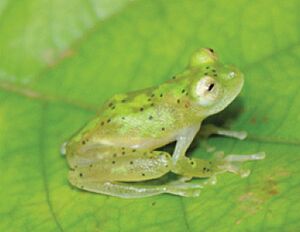Yuruani glass frog facts for kids
Quick facts for kids Yuruani glass frog |
|
|---|---|
 |
|
| Conservation status | |
| Scientific classification | |
| Synonyms | |
|
Centrolenella iaspidiensis Ayarzagüena, 1992 |
The Yuruani glass frog (scientific name: Hyalinobatrachium iaspidiense) is a special kind of frog found in South America. In Spanish, it's known as ranita de cristal de Jaspe. It belongs to a group of frogs called Centrolenidae, which are famous for their see-through skin.
Its scientific name, Hyalinobatrachium iaspidiense, comes from a place called Quebrada de Jaspe in Venezuela. This is the exact spot where this amazing frog was first found.
Scientists sometimes discuss if another frog, Hyalinobatrachium nouraguensis, is actually the same species as the Yuruani glass frog. As of early 2016, the International Union for Conservation of Nature (IUCN) sees Hyalinobatrachium nouraguensis as its own species. They consider it to be of "Least Concern", meaning it's not currently in danger.
Where the Yuruani Glass Frog Lives
The Yuruani glass frog can be found in many parts of South America. It lives in places like Venezuela, central Guyana, Suriname, and French Guiana.
You can also find it in western Ecuador, specifically in the Sucumbíos and Napo Provinces. It lives in northeastern Peru (in the Loreto Region) and western Brazil (in the Amazonas and Mato Grosso states). Scientists believe it might also live in Colombia, even though it hasn't been officially seen there yet.
What the Yuruani Glass Frog Looks Like
The Yuruani glass frog is quite small, growing to about 20.4 millimeters long from its snout to its rear end. That's less than an inch!
It has large eyes with irises that can be yellow or a dull silver color. Its fingers have webbing between the third and fourth ones. All of its toes are webbed, which helps it move around.
The frog's back, called its dorsum, is a yellowish-green color with bright leaf-green spots. The most amazing part is its belly, which is completely transparent! You can actually see its heart and other organs through its skin. This is why it's called a "glass frog."
Its Home and Safety
The Yuruani glass frog naturally lives in tropical forests. It prefers to stay near streams and rivers. These watery places are very important for its survival.
Sometimes, these frogs can be affected by habitat loss. This happens when their forest homes are destroyed or changed by human activities. Protecting these forests and rivers is key to keeping the Yuruani glass frog safe and healthy in the wild.


